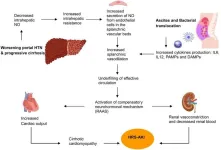The Foundation of Consortium of Multiple Sclerosis Centers (FCMSC) receives $100,000 gift for the June Halper MS Nursing Scholarship Fund
EMD Serono honors pioneer in MS comprehensive care
2024-09-25
(Press-News.org) (Hackensack, NJ, September 2024) The Foundation of the Consortium of Multiple Sclerosis Centers (FCMSC) recently received a generous donation of $100,000 from EMD Serono Inc., in honor of June Halper, MSN, APN-C, FAAN, MSCN. Ms. Halper a longtime pioneer in the comprehensive care movement for multiple sclerosis (MS), and leading nurse practitioner and MS advocate, passed away on July 24, 2024, at the age of 86, working until her final days as CEO of the CMSC, FCMSC and IOMSN (International Organization of MS Nurses).
Since 1978, Ms. Halper has specialized in MS and was the founder of the MS Center in Teaneck and served as its Executive Director, until co-founding CMSC. She served as CMSC’s President from 1995 to 1997 and as its Executive Director/CEO from 1992 until her death. Ms. Halper was passionate about multiple sclerosis (MS) nursing care, providing lifelong service to the field. Through her leadership, she transformed the landscape of treatment and support for people with MS.
EMD Serono’s gift to the June Halper MS Nursing Scholarship Fund will allow the FCMSC to provide high quality, patient-centered training programs to encourage and prepare more nurses-in-training for the rigorous practice of MS care. This generous donation will also play a key role in the continued success of the FCMSC Workforce of the Future programs, which are designed to encourage neurologists, researchers, nursing professionals, mental health professionals, and rehabilitation professionals to focus their careers on the delivery of MS care, thus growing the workforce needed to care for this patient population. To date, hundreds of healthcare professionals have directly benefited from FCMSC training and mentorship programs.
EMD Serono, the healthcare business of Merck KGaA, Darmstadt, Germany in the U.S., works to transform lives by developing and delivering meaningful therapies, and working to truly understand and respond to the therapeutic and support needs of individual patients.
“We are indebted to the dedication and legacy of work that June Halper provided to the MS community and the nursing profession,” said Jeffrey Wilken, PhD, President of CMSC. “Together with her team’s hard work to make the lives of people living with MS better, this generous donation from EMD Serono will help transform MS care for patients and their families across the globe for years to come.”
Ms. Halper earned her MSN in Nursing from Seton Hall University. In addition to her advocacy and leadership work, she served as an Editor or Co-editor for numerous publications including Multiple Sclerosis: A Self-Care Guide to Wellness and Nursing Practices in Multiple Sclerosis: A Core Curriculum.
For more information on CMSC, IOMSN and FCMSC and the educational programs and support offered to healthcare professionals, visit: www.mscare.org.
###
About FCMSC
The Foundation of the Consortium of Multiple Sclerosis Centers (FCMSC) was founded in 1999 with the mission to stimulate the growth, development and provision of patient care services, education and research in the field of MS and to enhance the quality of life of those affected by MS through supporting the activities of the Consortium of Multiple Sclerosis Centers (CMSC). It is currently estimated that nearly 1 million Americans and over 2.8 million people worldwide are living with MS. In order for MS patients to continue receiving the best care for generations to come, it is imperative that the workforce of MS healthcare professionals be large enough to meet the growing demands. The FCMSC has focused on aggressively recruiting and training the community of dedicated specialists in the field. The goal is to encourage medical students and other healthcare professionals to choose MS as an initial focus of study or to pursue more advanced and specialized training as part of their studies. By increasing the number of well-trained healthcare professionals in MS, and ensuring that they are well-trained and well-prepared, the medical community can continue to deliver the finest care, improve the quality of life for patients and families living with MS, and ultimately find a cure. For more information visit: https://cmscfoundation.org/
END
[Attachments] See images for this press release:

ELSE PRESS RELEASES FROM THIS DATE:
2024-09-25
Cirrhosis is one of the leading causes of mortality from non-communicable diseases, with complications arising as liver function deteriorates. HRS and HPS represent the most severe outcomes of cirrhosis, associated with systemic vasodilation driven by elevated levels of vasodilators like nitric oxide (NO). These complications significantly impair renal and pulmonary functions, leading to high mortality rates. TIPS, by shunting blood from the portal to systemic circulation, can potentially improve renal function by increasing systemic blood volume. However, the diversion of NO through TIPS could exacerbate systemic hypotension, posing a risk to renal ...
2024-09-25
A landmark study led by UCLA Health has begun to unravel one of the fundamental mysteries in neuroscience – how the human brain encodes and makes sense of the flow of time and experiences.
The study, published in the journal Nature, directly recorded the activity of individual neurons in humans and found specific types of brain cells fired in a way that mostly mirrored the order and structure of a person’s experience. They found the brain retains these unique firing patterns after the experience is concluded and can rapidly replay them while at rest. Furthermore, the brain is also able to utilize these learned patterns to ready itself for future stimuli following that experience. ...
2024-09-25
TAMPA, Fla. (Sept. 23, 2024) – The ocean’s twilight zone is deep, dark, and — according to new research — iron deficient.
No sunlight reaches this region 200 to 1,000 meters below the sea surface, where levels of iron, a key micronutrient, are so low that the growth of bacteria is restricted. To compensate, these bacteria produce molecules called siderophores, which help the bacteria scavenge trace amounts of iron from the surrounding seawater.
The paper detailing these unexpected findings from the Pacific Ocean will publish on Wednesday, Sept. 25, at 11 a.m. ET (4 p.m. London Time) in Nature, and will be viewable at that time at this link. The ...
2024-09-25
These fossils, belonging to the mammal-precursor species Brasilodon quadrangularis and Riograndia guaibensis, offer critical insights into the development of the mammalian jaw and middle ear, revealing evolutionary experiments that occurred millions of years earlier than previously thought.
Mammals stand out among vertebrates for their distinct jaw structure and the presence of three middle ear bones. This transition from earlier vertebrates, which had a single middle ear bone, has long fascinated scientists. The new study explores how mammal ancestors, known as cynodonts, evolved these features ...
2024-09-25
People with Down’s syndrome face a higher risk of developing Leukemia. Now researchers from the University of Copenhagen and Stanford University explain why, by identifying specific changes in blood cells of people with Down’s syndrome.
In the world, one out of 700 children are born with Down’s syndrome. A syndrome, where the child has an extra copy of chromosome 21, resulting in 47 chromosomes instead of 46. This typically results in characteristic physical features and some level of learning disability.
But newborns with Downs syndrome also tend to have an elevated number of red blood ...
2024-09-25
About The Study: Treatment-emergent nirmatrelvir resistance mutations were commonly detected, especially in individuals who were immunosuppressed in this cohort study of 156 participants. However, these mutations were generally present at low frequencies and were transient in nature, suggesting a low risk for the spread of nirmatrelvir resistance in the community with the current variants and drug usage patterns.
Corresponding Author: To contact the corresponding author, Jonathan Z. Li, MD, MMsc, email jli@bwh.harvard.edu.
To access the embargoed study: Visit ...
2024-09-25
About The Study: In this study, semaglutide was associated with reduced opioid overdose risk in patients with comorbid type 2 diabetes and opioid use disorder, suggesting its potential therapeutic value for preventing overdoses. The results need validation from other data resources and study populations. Further research is warranted to investigate the underlying mechanisms and randomized clinical trials are necessary to corroborate the clinical effects on opioid use disorder.
Corresponding Authors: To contact the corresponding authors, email Rong Xu, PhD, (rxx@case.edu) ...
2024-09-25
Food fermentation is the oldest production practice using microorganisms in human history. Milk fermentation, for example, can be traced back to 6000–4000 BC in India, and Mediterranean populations produced and consumed cheese as early as 7000 before present (BP).
Despite the long history of human consumption of fermented products, though, little has been known about the history of the use of fermentative microorganisms and the history of related cultural transmission. In particular, the evolutionary trajectories, especially functional adaptation, of these ...
2024-09-25
Adults with opioid use disorder who receive a higher daily dose of the opioid addiction treatment medication buprenorphine may have a lower risk of subsequent emergency department visits or use of inpatient services related to behavioral health (such as for mental health and substance use disorders) than adults receiving the recommended dose, according to an analysis funded by the National Institutes of Health (NIH). These findings suggest that higher buprenorphine doses could be more effective in managing opioid use disorder, which may be particularly relevant for improving treatment for those who use fentanyl, a major ...
2024-09-25
With the climate pattern known as El Niño in full force from mid-2023 to mid-2024, global temperatures broke records for 12 months in a row. As one of the strongest El Niño events on record, it was likely the main culprit of unprecedented heat, floods and droughts worldwide.
In a new study published Sep. 25 in the journal Nature, a University of Colorado Boulder climate scientist and collaborators reveal that the planet could see more frequent extreme El Niño events by 2050 if greenhouse gas emissions continue to increase.
“It’s ...
LAST 30 PRESS RELEASES:
[Press-News.org] The Foundation of Consortium of Multiple Sclerosis Centers (FCMSC) receives $100,000 gift for the June Halper MS Nursing Scholarship Fund
EMD Serono honors pioneer in MS comprehensive care




